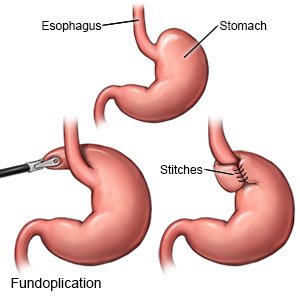Fundoplication in Adults
Medically reviewed by Drugs.com. Last updated on Jun 30, 2025.
What do I need to know about fundoplication?
Fundoplication is surgery to treat gastroesophageal reflux disease (GERD). During this surgery, the top part of your stomach is wrapped around the lower part of your esophagus. This prevents stomach acid from moving up into your esophagus.
How do I prepare for surgery?
- You may need to have tests such as a scope or barium swallow in the weeks before surgery. Ask your healthcare provider for more information about these tests. Do not smoke for at least 4 weeks before surgery. Smoking can cause damage to your esophagus and prevent your body from healing properly. If you smoke and need help to quit, talk to your healthcare provider. You may need to stop taking blood thinning medicines for 1 week before surgery. He or she will tell you to use acetaminophen for pain instead of NSAIDs. NSAIDs can cause bleeding.
- Your healthcare provider will tell you not to eat or drink after midnight the night before your surgery. He or she will also tell you what medicines to take or not take the morning of your surgery.
Related medications
Nexium
Nexium is used to treat GERD and other conditions involving excessive stomach acid. Learn about ...
Botox
Botox is used cosmetically to reduce facial lines and wrinkles and for medical purposes for ...
Protonix
Protonix (pantoprazole) is used to treat erosive esophagitis and other conditions involving excess ...
Prilosec
Prilosec (omeprazole) is used to treat symptoms of GERD and other conditions caused by excess ...
Dexilant
Dexilant is used for barrett's esophagus, erosive esophagitis, GERD
Phazyme
Phazyme is used for endoscopy or radiology premedication, functional gastric disorder, gas ...
Famotidine
Famotidine is used to treat and prevent ulcers in the stomach and intestines. Learn about side ...
Pantoprazole
Pantoprazole is a proton pump inhibitor used to treat GERD, erosive esophagitis, and ...
What will happen during surgery?
- You will be given general anesthesia to keep you asleep and pain free during your surgery. You will be given antibiotics to prevent an infection.
- Your surgery may be done as an open procedure. During an open procedure, a large incision will be made in your abdomen. Your healthcare provider will open your abdomen to do the surgery. Your surgery may instead, be done laparoscopically. Several small incisions will be made in your abdomen. Your healthcare provider will put a scope and tools through the incisions to do the surgery.
- The upper portion of your stomach will be wrapped around the esophagus. This will help the valve between the esophagus and stomach close better. Your healthcare provider may also repair the muscles of your esophagus if they are weak. The incisions are then closed with stitches or surgical tape and covered with bandages.
 |
What will happen after surgery?
Healthcare providers will help you walk to prevent blood clots. You may have a nasogastric (NG) tube in your nose. The NG tube goes through your nose into your stomach. It will be attached to suction. This will prevent fluid from backing up into your stomach. It also allows your surgery area to start healing. You may have a catheter in your bladder. You can leave the hospital when you are eating and drinking and your pain is controlled.
What are the risks of surgery?
You may bleed more than expected or get an infection. If your wrap slips or moves your GERD may come back or you may experience bloating or trouble swallowing. You may have a reaction to the anesthesia. Your esophagus, stomach, or other organs may be damaged during surgery.
Care Agreement
You have the right to help plan your care. Learn about your health condition and how it may be treated. Discuss treatment options with your healthcare providers to decide what care you want to receive. You always have the right to refuse treatment. The above information is an educational aid only. It is not intended as medical advice for individual conditions or treatments. Talk to your doctor, nurse or pharmacist before following any medical regimen to see if it is safe and effective for you.© Copyright Merative 2025 Information is for End User's use only and may not be sold, redistributed or otherwise used for commercial purposes.
Further information
Always consult your healthcare provider to ensure the information displayed on this page applies to your personal circumstances.
